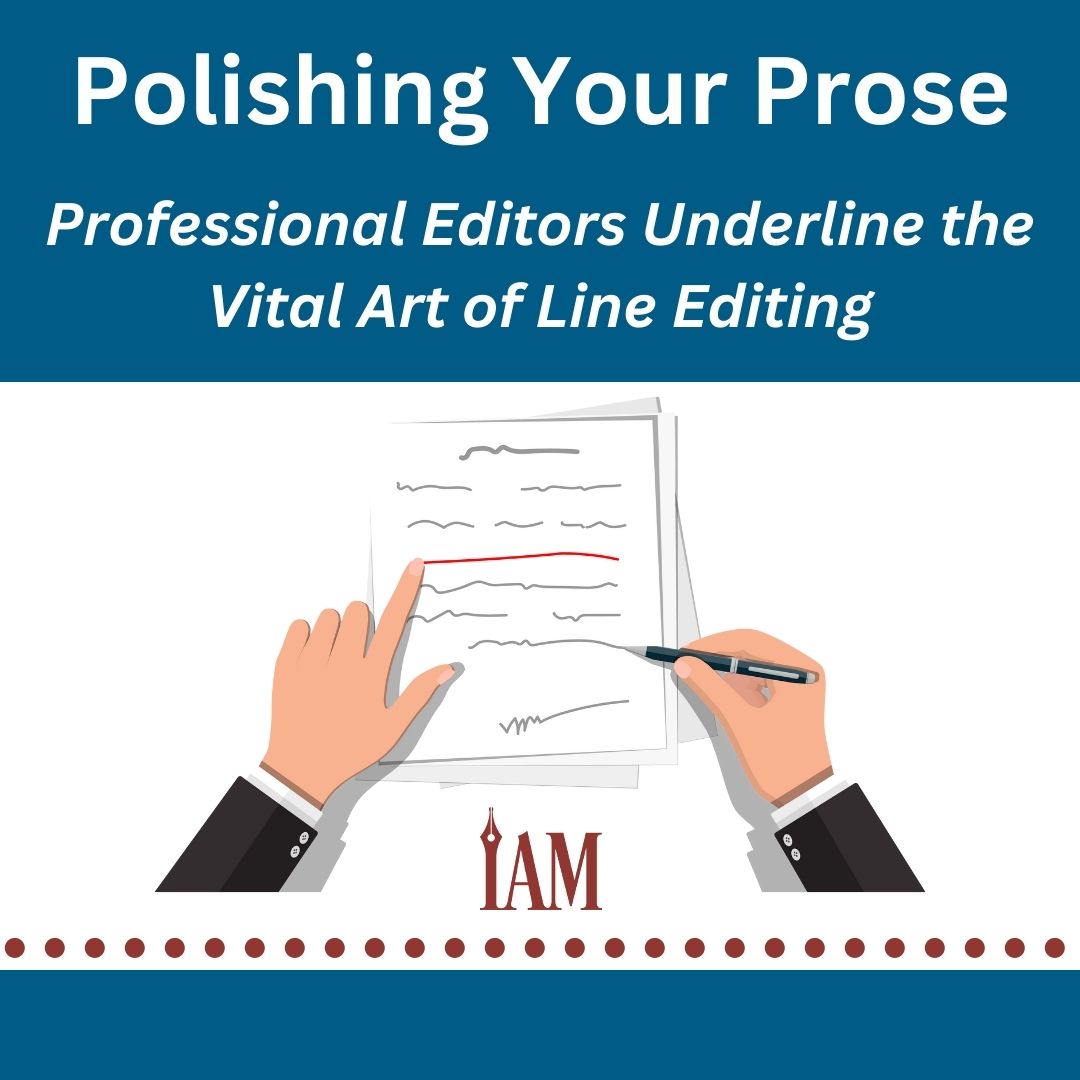Professional Editors Underline the Vital Art of Line Editing
Ernest Hemingway famously said “write drunk, edit sober." But what if you were still a little hungover when you learned about each of the different styles of editing?
Each type of revision may play a unique, but no less important, role in the editing process, but in novel editing, one stage of corrections seems to be easier for authors to brush over than the others—even if professional editors say you shouldn’t.
Confused? Don’t worry. Let’s back up and start with a basic overview of each stage.
Structural/Developmental Editor
Looks at the "big picture,” focusing on things like plot, character development, theme, and point of view.
When: You want guidance in writing your story, or you’ve finished a draft and want to know if it "works.”
Line Editor
Focuses on writing style and voice, pointing out awkward phrasing, unnecessary repetition, telling vs. showing, passive voice, dialogue, and any inconsistencies.
When: You know your draft is structurally sound and "works" in the big picture, and you’re ready to dive into more thorough corrections.
Copy Editor
Corrects spelling, grammar, and punctuation. Copy editors address commonly confused words and ensure consistency with capitalization, hyphenation, and numerals.
When: Your draft works, and your prose has been polished; you don’t need to make any more story-level changes.
Proofreader
Makes sure your book is as error-free as possible. Proofreaders check the "proof copy" for typographical errors, as well as look for layout and page number problems.
When: The book is formatted for print or digital publication.
If you did a double take when line edits and copyedits came up as two different edits, you’re not alone. Grab yourself a strong cup of coffee and settle in for a deep dive into what is probably the least understood phase of the editing suite: line editing.
The Finer Points of Line Editing
“Line editing is much more in-depth than copy editing,” says Kelly Rigby, a freelance editor, creative consultant, and writing coach with qualifications in creative writing and over twenty-five years combined experience working as a writer and editor. “It’s also called stylistic editing, and for good reason—line editing is about the art of writing and storytelling rather than the grammatical mechanics of it, which is what copyediting is.”
Jo Speirs is also an experienced line editor, copyeditor, and proofreader. “The main focus of a line edit is to ensure the story is as clear and engaging as possible to your readers, which is done through pace and flow, style, and tone, all while ensuring consistency,” she says. “Structural editing may look at the complete story, but line editing examines the individual pieces of the whole.”
A line edit can elevate your story from good to great, from a reader losing interest after the first chapter to them staying up late into the night turning the pages. Through line editing, you can create a more immersive story by showing rather than telling and discover ways to go deeper with your characters and create more engaging dialogue, all while retaining the authenticity of the author’s voice. A line edit can also add clarity to passages that may confuse readers.
How do you know if your manuscript needs a line edit? According to Rigby, it’s vital to any story. “We can’t see our own work clearly—everyone needs an outside, professional opinion. I would argue that even if you are a skilled writer, you need external help with your work.”
Speirs believes that if the manuscript has been through the structural editing stage and the author is comfortable with the overall plot, characters, and flow, but wants to make the story even better with a new perspective, a line edit could do the trick.
In an ideal world, authors would complete a developmental edit, line edit, copy edit, and proofread for each book. However, it’s costly to be ideal, and authors tend to look at where they can get the biggest bang for their buck. If you have limited funds but want to build a long-term author career and audience, Rigby’s advice is to spend money on a line editor who will consider copyediting elements at the same time.
“Emotional investment is everything,” she says. “Some copy editors will probably scream at me saying this, but copyediting and proofing make your end product look professional, but developmental and line editing make your reader buy your book, fall in love with it, and sing its praises to fellow readers.”
Food for thought, especially with software such as ProWritingAid or Grammarly that may help with copyediting and proofreading, not to mention peers and ARC readers who can spot any errors that still slip through.
So where can you find a good line editor, and how would you know if they are any good?
Like with any editor, the best way to start is by doing your research. “A line editor should be willing to do a sample edit and have specific markups to offer on your work,” Rigby says. “If they have little to contribute and your pages look clean, then I doubt they know what they’re doing. Seeing markups on your work is not a negative; it’s an opportunity to learn.”
Rigby agrees that asking for recommendations from trusted peers and having a chat with the editor to see if they understand what you are striving for is essential. “You want someone who works with your writing style and helps you enhance it, not someone who tries to change you. And they should be upfront about expenses and timing.”
Investing in a professional editor is one of the best things you can do for your manuscript. Your story will be much stronger with enhanced readability, and your skills and knowledge as a writer will also improve. But exactly how much of an investment are we talking?
The cost of editing varies from one editor to the next, though it is often determined by multiple factors:
- the time the editor will spend on your manuscript,
- the type of editing required,
- the number of edits or passes needed,
- the deadline or timeline to publication,
- the word count, and
- the quality of the writing.
Some editors price per word, others per page, and others per hour. Rigby recommends going with someone who prices per hour—you can still set a total cost at which you want them to stop and send you what they’ve done. Rigby says you can expect to pay at least $40 per hour for a professional editor, but someone experienced may charge up to $55 to $75 per hour.
“As a guide, for a fifty-thousand-word, structurally sound manuscript, the cost would be around $950,” says Speirs. “Other editors charge more, and others charge less. Again, do your research—like you would for any major purchase, ask for quotes and what the service includes, and work within your budget.”
Of course, you can get editing much cheaper. But it’s worth remembering that you’ll likely get what you pay for.
“Book editing is expensive because it's a meticulous process,” Speirs says. “Editors have to go through the book with a fine-tooth comb, checking for inconsistencies and grammatical errors. They have to make sure the book has a cohesive voice, consistent tone and a clear plotline, is entertaining, and is a book people will want to read.”
Working with a reputable editor is a valuable opportunity for skill development. “At the very least, it’s worth hiring a quality and recommended line editor at some point early in your career, just so you can learn from them,” says Rigby.
The moral of this story is that a good line editor will help make you a better writer. They can help you find your writing style and voice—that something special that will make you stand out. And though it can be easily overlooked by authors, that extra polish on your book might just be worth its weight in gold.

